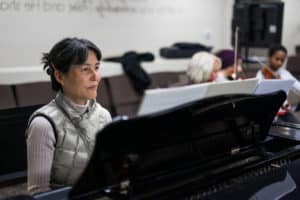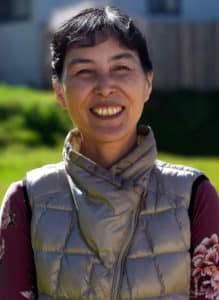Overture
The metronome ticks steadily against the fluidity of Mariko Kinjo’s fingers as they glide up and down the keys. With the backdrop of a piano lesson, I look around a house that embodies music: a cello case, two organs, a harp, a violin and a piano. Lining the shelves are volumes of music in thick, leather-bound books.
After the lesson, Mariko, a woman with a gentle, contented manner, sits across from me and begins to recount her life story. She tells me that sharing her story is a blessing and constant reminder of how God has led her so far. Slowly, her story pours out like the beginning of a symphony.
Allegro
Mariko Kinjo grew up in the Chiba prefecture of Japan. The prefecture lies just to the east of Tokyo.

Her father, Hideo, was orphaned at the age of twelve but soon rose to eminence as a Japanese chef in a local restaurant. But despite the fame, he was constantly haunted by thoughts of death. All of his immediate family members had died due to various circumstances and with no one to look out for him, he was afraid he would be the next.
One day, a Christian-book salesman known as a colporteur came to the predominantly Buddhist area of his town and met Hideo. Though the angry townspeople told the colporteur to leave, he could not erase Hideo’s face from his mind. Even though the colporteur knew the townspeople would be enraged if he returned, he went back to secretly meet with Hideo and gave him a copy of a magazine called Signs of the Times. Stunned by what he read, Hideo started bible studies with the colporteur. As his questions about death were answered, he began to realize the love of Jesus and was soon baptized.
Meanwhile, Mariko’s mother, Yumiko, was on her own faith journey while working as a nanny in America for a few years. The children she cared for during the first year would ask her questions about the Bible. Never having read or even heard of the Bible, these encounters triggered a series of questions in her mind. Around the same time, her sister passed away, leaving Yumiko confused about death, life, and God.
Not long after, Yumiko began working for an Adventist family. The husband was a bible worker, and the wife happened to be Japanese. As she began Bible studies in Japanese, she saw the correlation between sin and a Saviour, death, and the resurrection. As a result, she decided to be baptized.
Yumiko later moved back to Japan and married Hideo. As the years passed and their children grew, they wanted their two children to have an Adventist education. They sacrificed in many ways such as choosing to live close to the rural Adventist school even though it meant Hideo left for work at 3:00 a.m. on his motorbike every morning and came home late. As a result of her parents’ sacrifices Mariko had a carefree childhood. Because her school was located in the mountainous region of Hiroshima, the rural environment was a child’s wonderland. She recalls picking wild edibles, “sledding” downhill on cardboard, and jumping into creeks.
Andante
Near the end of high school, Mariko was at a crossroads between pursuing nursing or music as her future profession. She prayed for wisdom and, wanting to test the waters, she began looking for music schools to apply to. She soon found the only music school that didn’t have an entrance examination or classes on the Sabbath. But her heart sank as she recognized what kind of school it was. She says, “most people who went that school were trained from kindergarten, through elementary, and high school just to try and earn a spot at this extremely selective school.” She realized that she needed additional lessons to have even a slim chance of passing the entrance exam.
So she began lessons to help her pass the tough entrance exam. Though it was a six-hour commute by car once a month, Mariko persisted.

As she began the intense lessons, she soon realized her weaknesses in ear-training and sight reading. She was “easily distracted by noises” and had trouble reading notes. Worried, about failing the entrance exam, she began claiming the promises of God. James 1:5 “If any of you lack wisdom, let him ask of God,” and the book Steps to Christ became her anchors. For the first time, her faith began to grow as the promises of the Bible became personal to her.
The more she realized her need, the more earnestly she leaned on the promises. Mariko says it got to the point where “I read my bible more than I practiced piano.” Despite this, Mariko struggled between wanting to get into this school and totally surrendering her future to God’s will. “Once I understood that it was not my will but His will, then even if I wasn’t accepted, it was okay. I had this perfect peace.” Mariko says that after the surrender, “surprisingly, my ear training improved so much more and I was able to understand music theory and sight reading much better.”
Scherzo
The day of the first exam had finally arrived. In the morning, Mariko awoke to a thick layer of snow blanketing the outside world. Snow was extremely unusual becasue the climate was relatively mild for that time of the year. But what was unusual was the silence outside. Mariko says with a near whisper, “Everything was quiet. There were no airplanes, no traffic; the trains had stopped—it was so quiet.” When Mariko arrived to take her ear-training exam, she found that she could concentrate perfectly on the music that was being played. With confidence, she wrote down all that was played and finished her exam in good time. With a smile on her face and a skip in her step, she went home.
Later that same day, the sun came out, and as the snow melted the city revived to its noisy state. Upon arriving home, Mariko’s mother enthusiastically approached her and shared the verse she had read that very morning: “Hast thou entered into the treasures of the snow? or hast thou seen the treasures of the hail, Which I have reserved against the time of trouble, against the day of battle and war?” (Job 38:22,23). Mariko was shocked. The family soon found out that the last time it had snowed like that was 40 years before!
The dreaded sight-reading test was next. With rising anticipation, Mariko sat down at the piano and began to play through the unfamiliar piece in front of her. But only a few measures into the music, she blundered. “All of a sudden I messed up. I didn’t know how to count. I didn’t know what was going on! I thought that I was going to fail.”
Intermission (Stay tuned for part 2)
